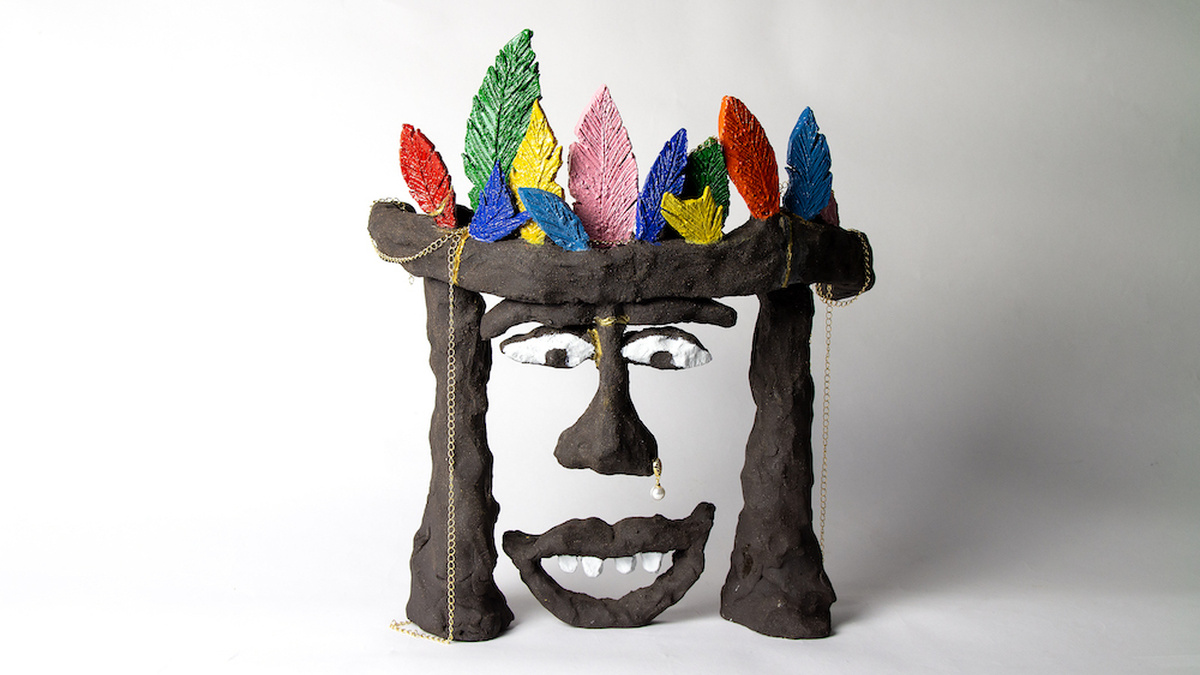Jalsaghar: ‘Present’-ing the Future / Recognizing the Past
Mythology, popular culture and Social Justice: Women and Caste in the Mahabharata
Tue 29 October 2024

Wheelchair accessible

Debjani Banerjee, Putna, Ceramic, jewellery, enamel paint, gold leaf. Photo by Oana Stanciu.
The Mahabharata is the ultimate example of a story so good it refuses to fade away. Alongside its gripping multi-layered narratives of court intrigues, heroism, family rivalries and filial piety, it conveys much that is considered essential in traditional Indian values of state and family life. It is however, also riddled with scenarios and characters that raise questions about the very hierarchies that are portrayed as inevitable parts of those values. Questions about the ethics of key actions by some of the story’s heroes are commonplace. For this reason, many have argued that the Mahabharata is deeply embedded with feminist critique and challenges to the prevalence of caste as a social system. Intriguingly, right in the middle of the Mahabharata sits book six, The Bhagavad Gita, usually studied on its own for its discussion of non-attached action and self-knowledge.
Speaking from a non-specialist perspective, this talk looks at some of the contradictions within the main Mahabharata story as it is commonly known, and references academic studies as well as current blogs and popular responses that shed light on messages that can be derived from it.
Workshop: Songs of Social Justice
With Kapil Seshasayee
How does a song come out of anger? Protest songs are powerful capsules of current concerns that become reservoirs of history. Often, they keep alive names of protagonists that have slipped or been deliberately erased from mainstream texts. Kapil Seshasayee is known for his searing lyrics about caste discrimination in India and racism within Indian society and the diaspora. He is also known for his unique fusion of south Indian classical Carnatic music with contemporary sound on electric guitar.
We hear from him about how his songs come about, and do some song writing ourselves. The workshop asks us to consider ways in which issues translate into music, what ethics arise and what balance is needed between informative, emotional and lyrical content.
About Kapil Seshasayee
Kapil Seshasayee is a British Tamil artist fusing R&B, South Indian classical and experimental rock music. Kapil has amassed a number of high profile collaborations and commissions including a rework of a Ravi Shankar composition to commemorate his 100th birthday for BBC Asian Network, a collaborative single with Rap legend LIL B.
‘Present’-ing the Future / Recognizing the Past
A four-part immersion into historical and cultural themes in Debjani Banerjee’s Jalsaghar by Dr. Ranjana Thapalyal and guests
The references in Jalsaghar are rich and varied, encompassing the classics of ancient Indian literature, their presence in pop culture, and the politics of migration rooted in Britain’s colonial history. Most vividly, Jalsaghar brings before us the vibrant characters of the Mahabharata, India’s c. second-century BCE epic, a complex and intricately woven tale that has been told, retold, and passionately discussed through the ages. Contemporary interpretations and critiques abound, both in everyday conversations and academic studies. Banerjee’s selection of characters from the Mahabharata float alongside snippets of recent British political history, with its long reach back to colonial-era decisions. These characters also resonate with themes of migration and personal diasporic experience, of belonging, and the transgressions required to assert hybrid cultural identities. This series of workshops and talks delves into these subjects with the aim of critically contextualising them, exploring connections to contemporary questions about community, human relations, spirituality, and art’s role in reflecting on all of this.
There will be four sessions of 2 hours, each consisting of a talk and a practical workshop. We suggest you attend all four sessions to get a more in-depth sense of the issues and ideas we will touch on, but if this is not possible, you are welcome to attend a selection.
About the artists and workshop facilitators
Dr. Ranjana Thapalyal
Dr. Ranjana Thapalyal is
an Indian born inter-disciplinary artist and academic, based in
Glasgow, Scotland. Her practice spans ceramics, painting, collaborative
performance, creative and critical writing. Research has played a
significant role in her work, focussed on the nature of materials
themselves in the early work, to broader philosophical concerns leading
to written publications and collaborations. Of particular interest are
concepts of ‘self’ in South Asian and West African traditions, feminist
readings of ancient philosophies of the South, cultural politics and the
development of decolonising, anti-racist strategies for art pedagogy.
India Boxall
India is a creative researcher and facilitator whose work explores transdisciplinary practices and diffractive pedagogies. Her interests lie in subverting conventional notions of theory, matter, and language, viewing knowledge creation as an active, kaleidoscopic practice for the multifaceted self. This practice spans drawings, textiles, sculpture, text, and digital media, often incorporating unconventional materials. She is a co-conspirator of MUCK (Must Use Critical Knowledge), an online archive dedicated to critical art writing and visual practices.
Rudy Kanhye
Rudy Kanhye is a disabled artist and researcher from the global majority working between Mauritius, France and Scotland. His research interests include archives, memories, oral histories, extending this focus through Mauritius Island, the Global South and its neo-colonial relationship to the West. Born in Dijon, France and a descendent of Mauritian Indian indentured immigrants, he experiments with collaborative, interactive artworks which re-imagine archival research at the intersections between race, disability and the environment and the collective memories of migrant communities.
His recent focus has been on uncovering the hidden history of the labour system and the involvement of the British Empire and Scotland, to create a framework for increasing diversity, including interpretation of the legacy of the post-slavery system of indentured labour.
Shalmali Shetty
Shalmali Shetty is an independent curator, writer and artist working between the UK and India. Her research interests include themes of archives, memories and material culture studies. She intends to coalesce her backgrounds in art practice and theory in the production of the curatorial. She is the recipient of the Visual Arts and Craft Makers Award, Glasgow (2022); the Skinny Magazine x Edinburgh Art Festival Emerging Writers, Edinburgh (2023), and the Art South Asia Project x Serendipity Arts Foundation Curatorial Research Fellowship, UK and India (2023).
Kapil Seshasayee
Kapil Seshasayee is a British Tamil artist fusing r&b, south indian classical and experimental rock music.